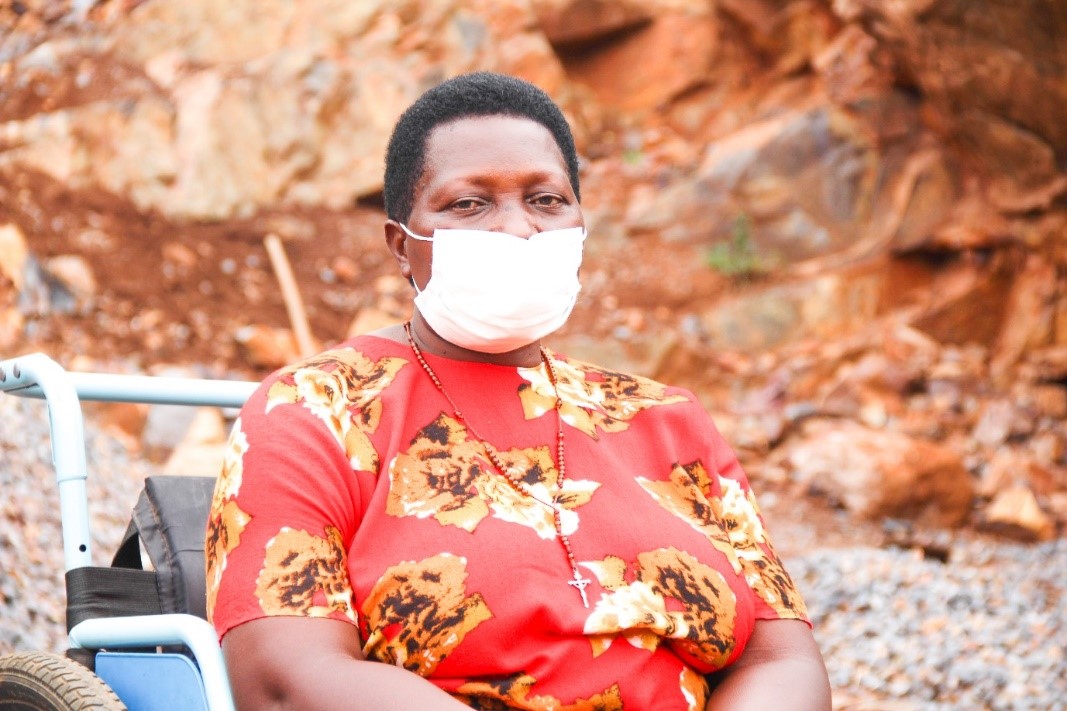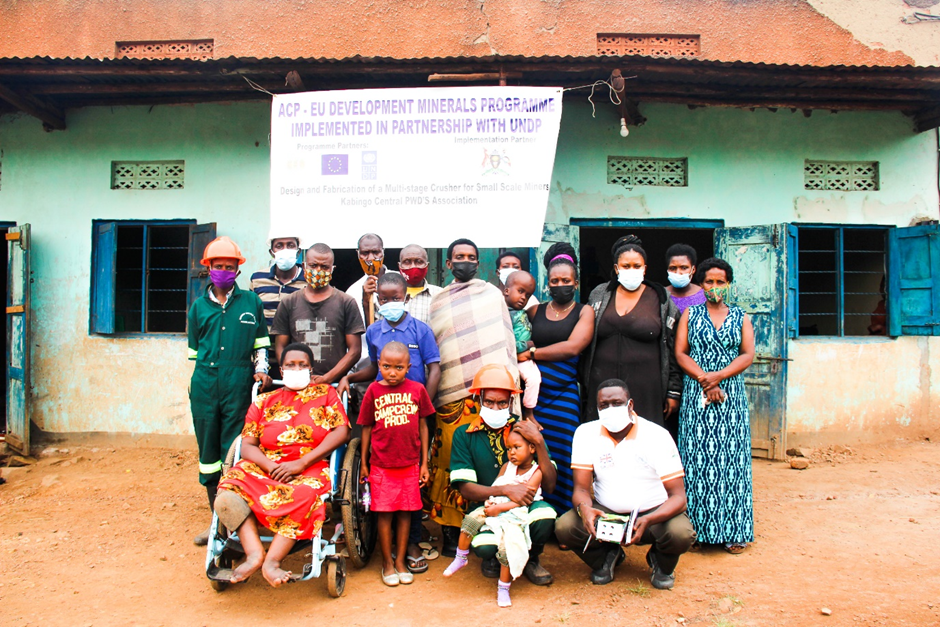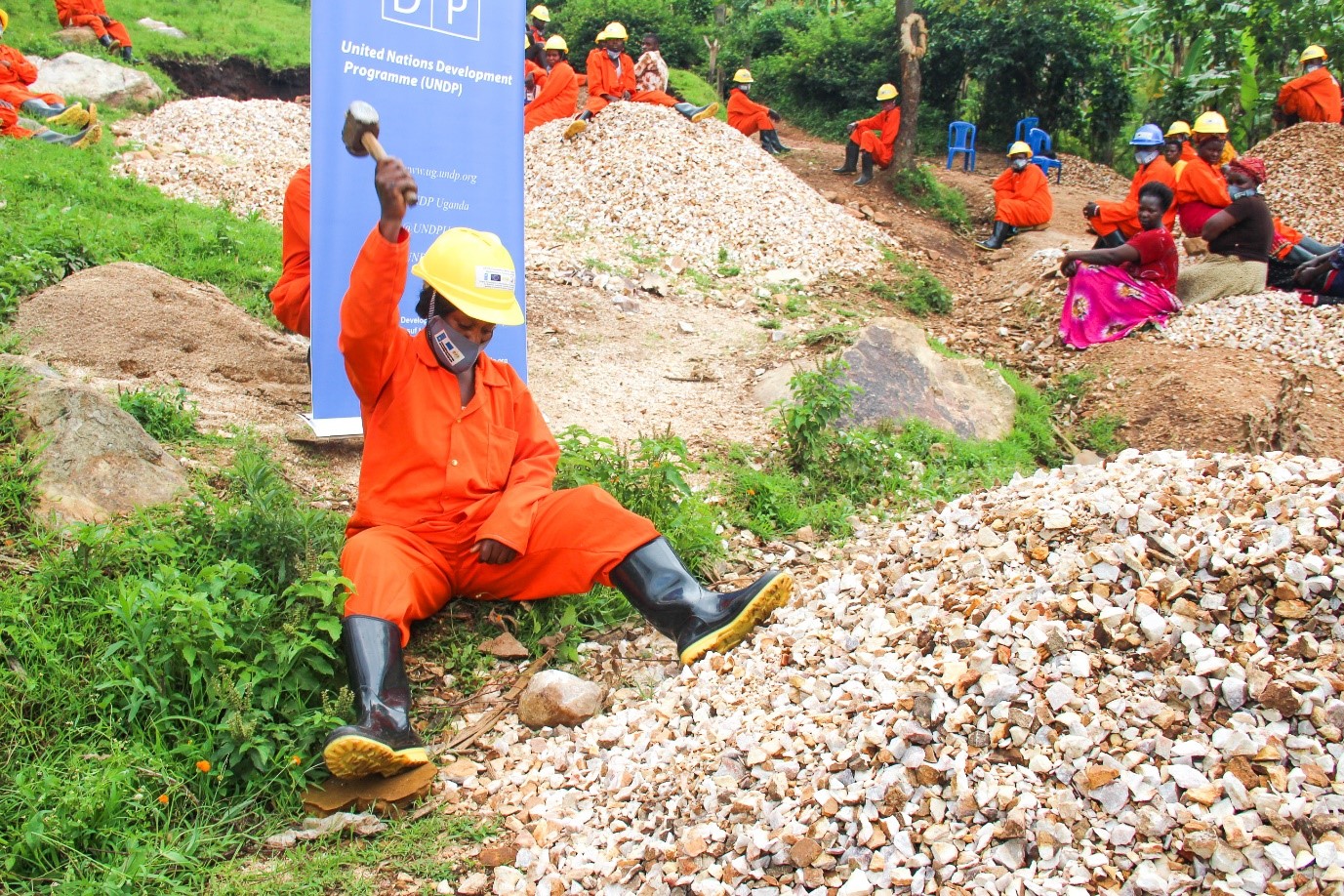Kirabo Mackline Nalingo on site.
Development minerals are widespread in Uganda, and the sector contributes approximately 350 million USD in production value annually while directly employing 390,000 Ugandans (44% of those being women). The COVID-19 pandemic put a strain on market and production in the development minerals sector which has led to livelihood loss, increased health risks during mining, as well as exclusion of socially vulnerable groups such as women and youth.
Kirabo Mackline Nalongo is a woman leader and secretary of Kabingo Central People with Disabilities Association in Kabingo subcounty, Isingiro District, Western Uganda. She works together with a team of 20 members stone quarrying in the rocky hilly areas of Kabingo subcounty.
To address constraints faced by small and medium enterprises (SMEs), the ACP-EU Development Minerals Programme an initiative of the African, Caribbean and Pacific (ACP) Group of States, financed by the European Union and the United Nations Development Programme (UNDP), and implemented by UNDP provides small grants to support associations, civil society organisations, and other stakeholders in the development minerals sector. 12 grantees in Uganda were selected for award of small grants and before commencing implementation, the 12 grantees were oriented on principles of UNDP project management and communication guidelines.
We spoke to Kirabo to learn about how the small grants programme has helped her association and its members improve their income, production, health, and safety.
“Previously our income was very low and all the money we got was spent on daily feeding of our families,” said Kirabo. But thanks to UNDP and other partners for this small grant, now we earn some extra money which has enabled us to save and venture into other projects like piggery and tailoring. We were also given face masks and have a washing area to guard against COVID-19. Similarly, we were also supplied with protective gear to provide safety against injuries at work.”
Growing up, Kirabo recalls how people with disability had always been ignored in her society. She explains that most of the time she was considered useless and a burden to society. Being the most visible and easiest option to pursue, she opted to start a stone quarrying business with the intention of proving doubters wrong that disability does not have to mean inability.
“The people with disability have previously been ignored,” she said. “But now they are well known, and people are appreciating their services.”
Kabingo Central People with Disabilities Association.
The Association was established in 2018 and was officially registered in May 2021, made up of 20 persons with disability out of which 15 are women, the objective of the association is to achieve financial sustainability. In furtherance of this objective, the association started a stone quarry, piggery and later tailoring business with all profits re-invested.
UNDP held a meeting with group members who appreciated the support given, noting that the community has benefited through job creation in the mining sites of Kabingo county.
The Chairman of the association disclosed that when one member lost an eye at the quarry from a flying stone, the association sought to mechanize its operations to prevent further injuries on site. They therefore started using a stone crusher machine. While at first this proposition seemed expensive and daunting, UNDP support has made this dream become a reality. They have designed a protype stone crusher machine which they intend to fabricate. Meanwhile, there has been progress on the implementation of the grant activities in respect of research and design for the prototype, as well as procurement of necessary materials.
The first phase of this initiative has covered three northern region grantees based in the districts of Nebbi, Lira and Gulu, while the second phase covers five grantees based in the Western and Central regions which are in the districts of Isingiro, Ibanda, Hoima, Bushenyi and Wakiso.
The 2030 Agenda for sustainable development and the Sustainable Development Goals (SDGs) represent the United Nations’ plan of action for social inclusion, environmental sustainability, and economic development. It is our shared belief that the mining industry has an unprecedented opportunity to mobilize human, physical, technological, and financial resources to advance the SDGs and to achieve Uganda’s development aspirations.
Mining is a global industry and is often located in remote ecologically sensitive and less developed areas that include many indigenous lands and territories. When managed appropriately it can create jobs, spur innovation, and bring investment and infrastructure at a game-changing scale. Yet if managed poorly, mining can also lead to environmental degradation, displaced populations, inequality and increased conflict, among other challenges.
The Development Minerals sector is dominated by socio-economically disadvantaged artisanal miners of small and medium business actors who experienced unprecedented business disruptions and shocks because of the COVID 19 Pandemic. The stringent lockdown measures by Government of Uganda to stem the transmission of the virus inevitably resulted into abandonment of the quarrying sites, loss of jobs and business opportunities. COVID19 put a strain on Market and production in the Quarrying activities thus leading to livelihood loss, increased health risks during mining as well as exclusion of socially vulnerable groups such as women and youth from related supply and value chains in the sector.
Female artisanal miner making aggregates.
UNDP selected Twelve (12) grantees for the award of small grants, and all had received funds by end of September 2021. The grantees were grouped into associations namely, Environmental Women in Action for Development (EWAD), Mid-Western Region Anti-Corruption Coalition (MIRAC), Ibanda Community Based Artisanal Miners (ICBAM), Kabingo Central PWDs Association, and Buhimba Quarry Association. Before commencing implementation, the 12 grantees were oriented about UNDP project management and communication guidelines. Through UNDP’s ACP-EU Development Minerals Programme, small and medium enterprises (SMEs) will continue to be supported to thrive in this sector and improve the livelihoods of those who are most vulnerable.

 Locations
Locations





